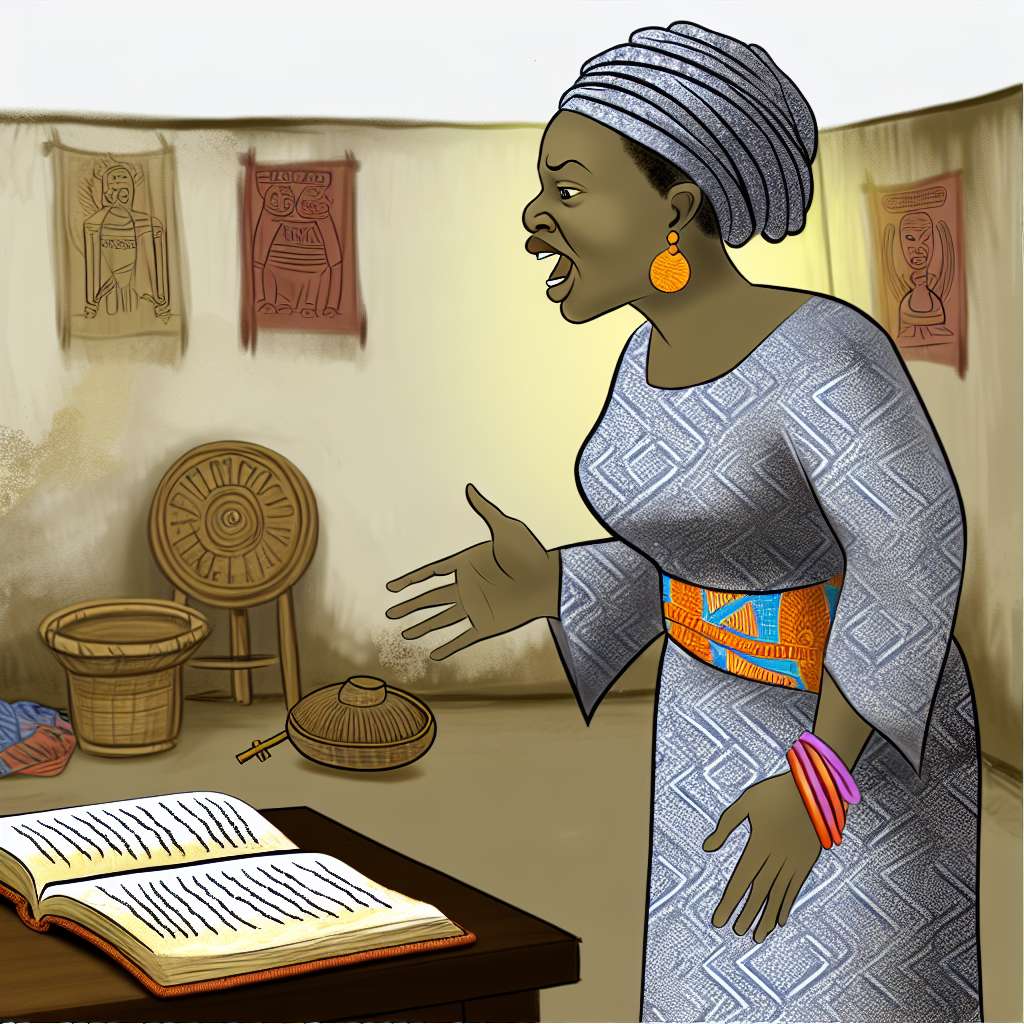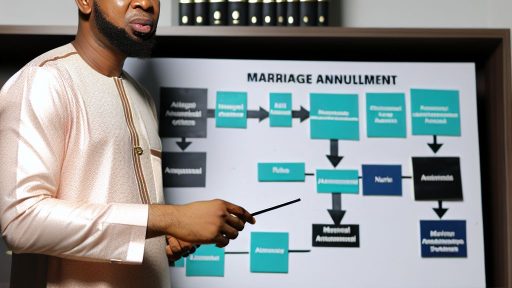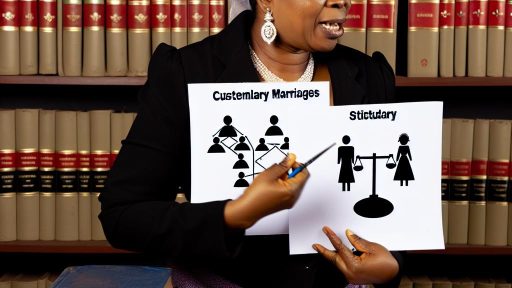Overview of Marriage Laws in Nigeria
Nigerian marriage laws encompass diverse cultural and religious practices.
These laws vary significantly between different ethnic groups.
Understanding these laws is crucial for enforcing women’s legal rights.
Types of Marriage in Nigeria
Nigerian law recognizes several forms of marriage.
These include statutory, customary, and Islamic marriages.
Each type has distinct legal implications and requirements.
Statutory Marriage
Statutory marriage is governed by the Marriage Act of 1970.
This type requires registration with the government.
Both parties must be at least 18 years old.
It offers legal recognition and specific rights to spouses.
Customary Marriage
Customary marriages follow local traditions and practices.
They often do not require formal registration.
This type emphasizes traditional rites and customs.
Women’s rights may be less protected under customary law.
Islamic Marriage
Islamic marriages are governed by Islamic personal law.
These marriages require the consent of both parties.
They typically include a marriage contract known as a ‘nikah.’
Women have specific rights outlined in Islamic law.
Legal Rights of Women in Marriage
Women’s rights in Nigerian marriages are evolving.
They include rights to property, maintenance, and child custody.
However, enforcement often varies by community and legal structure.
Challenges in Enforcing Women’s Rights
Cultural practices sometimes undermine statutory laws.
Women may face discrimination in accessing legal protections.
Education and awareness are essential for overcoming these challenges.
Importance of Legal Awareness
Understanding legal rights is vital for women in Nigeria.
Legal education empowers women to advocate for themselves.
Awareness programs can help bridge the knowledge gap.
Historical Context of Women’s Rights in Nigerian Marriages
Traditions and Social Norms
Nigerian marriages are deeply rooted in traditions and customs.
Historically, women have often had limited rights within these structures.
Family roles dictate that women primarily focus on domestic responsibilities.
This cultural norm has shaped perceptions of women’s rights in marriage.
Colonial Influence
The arrival of colonial powers significantly altered marriage practices.
Colonial laws introduced new concepts of individual rights.
However, these changes often marginalized local customs and traditions.
Many women found themselves caught between traditional roles and new laws.
Post-Independence Developments
After Nigeria gained independence, women’s rights began to evolve.
Activism grew as women demanded legal recognition and rights.
Legal frameworks started to reflect the aspirations of women’s movements.
Notable laws emerged to protect women’s rights in marriages.
Current Legal Framework
Today, the legal landscape for women’s rights in Nigerian marriages is diverse.
Multiple systems exist, including statutory and customary laws.
These laws sometimes conflict, which can create confusion.
Despite progress, many women still encounter legal challenges.
The Role of Education and Empowerment
Education plays a crucial role in changing societal perceptions.
Empowering women through education helps them assert their rights.
Greater awareness leads to increased demands for gender equality.
Collectively, these changes contribute to improving women’s rights in marriage.
Legal Framework Governing Women’s Rights in Nigerian Marriages
Constitutional Provisions
The Nigerian Constitution outlines women’s rights in marriages.
It emphasizes equality between men and women.
Additionally, the Constitution prevents discrimination based on gender.
Specifically, Section 42 guards against inequality.
Legal Marital Systems
Nigeria recognizes various marital systems.
These include statutory, customary, and Islamic marriages.
Each system has its legal implications for women’s rights.
Statutory marriages follow established legal frameworks.
Customary marriages adhere to local traditions and practices.
Islamic marriages operate under Sharia law.
Property Rights
Under Nigerian law, women have certain property rights.
They can own and inherit property in statutory marriages.
Customary practices, however, may limit these rights.
Women’s rights to property are also outlined in various laws.
These include the Land Use Act and the Matrimonial Causes Act.
Health and Welfare Rights
Women have rights concerning their health and welfare.
This includes access to healthcare and reproductive rights.
The law mandates equitable treatment in medical settings.
Furthermore, women’s safety from domestic violence is paramount.
Various laws address domestic violence and seek justice.
Legal Aid and Support Services
Legal aid services are available for women seeking help.
These services assist in marital disputes and domestic violence cases.
Non-governmental organizations also play a vital role.
They offer counseling and legal representation.
Challenges and Barriers
Despite legal provisions, challenges persist for women.
Societal norms often hinder women’s rights in marriages.
Access to justice remains a significant barrier.
Many women face financial and educational disadvantages.
These barriers can limit women’s ability to assert their rights.
Find Out More: Marriage Rights and Obligations in Nigeria: What Every Couple Should Know
Marriage Types in Nigeria
Customary Marriage
Customary marriage is the most common type of marriage in Nigeria.
This form of marriage occurs according to the traditions of various ethnic groups.
Each community has its own rules and practices governing marriage.
Cultural approval is essential for a customary marriage to be valid.
In some cases, bride price is negotiated before the marriage takes place.
Women in customary marriages have specific rights and expectations.
However, these rights can vary significantly by culture.
Furthermore, women may face challenges regarding inheritance and property rights.
Islamic Marriage
Islamic marriage is another prevalent form of marriage in Nigeria.
This type of marriage follows Islamic law, or Sharia.
In Islamic marriages, both parties consent to the union.
There are rules concerning dowry, known as mahr, which must be paid by the groom.
Women have rights to property and financial support in Islamic marriages.
However, it is important to note that interpretations of Islamic law can differ.
For instance, some interpretations may limit women’s rights during divorce.
Consequently, understanding local practices is crucial for women’s rights.
Civil Marriage
Civil marriage in Nigeria is governed by statutory laws.
This type of marriage offers legal recognition and rights enforced by the state.
Couples must register their marriage with the government to make it valid.
In a civil marriage, both spouses generally have equal rights and responsibilities.
Women in civil marriages enjoy protection under Nigerian legal frameworks.
These protections include rights to inheritance and equitable distribution of property.
Moreover, civil marriage provides a clear process for divorce and legal separation.
Overall, civil marriage can offer more security for women compared to custom or Islamic forms.
You Might Also Like: What You Need to Know About the Legal Implications of Nigerian Marriages
Rights of Women in Customary Marriages
Understanding Customary Marriages
Customary marriages are deeply rooted in Nigerian culture.
These marriages vary significantly among different ethnic groups.
They often adhere to traditions that govern family and societal roles.
Women’s rights within these marriages stem from both traditional practices and statutory laws.
Legal Framework for Women’s Rights
The Nigerian Constitution recognizes rights for all citizens.
Equally, various laws protect women’s interests in customary marriages.
The Matrimonial Causes Act plays a significant role in this regard.
This law governs property rights and guardianship issues.
Furthermore, the Child Rights Act emphasizes children’s welfare in marriages.
Economic Rights and Property Ownership
Women have the right to own and manage property in customary marriages.
Traditionally, men often control family resources.
However, laws now empower women to claim their share of family wealth.
Ownership disputes may arise, but legal recourse is available.
Engaging legal aid can be beneficial for women seeking property rights.
Rights to Personal Autonomy and Consent
Women must provide informed consent to engage in a customary marriage.
This consent ensures they are active participants in their marital choices.
Regrettably, some women face pressure to conform to traditional norms.
Advocacy for women’s autonomy remains crucial in these situations.
Rights to Protection from Abuse
Women have rights to protection from domestic violence.
The Violence Against Persons (Prohibition) Act provides legal avenues for this protection.
Women experiencing abuse should seek help from local authorities.
Community support networks also play a vital role in providing assistance.
Access to Legal Support and Resources
Access to legal resources is essential for women in customary marriages.
Legal aid organizations offer support for women facing challenges.
Women should be aware of their rights to utilize these resources effectively.
Education about legal rights enhances women’s capacity to advocate for themselves.
Cultural Practices and Women’s Rights
Cultural beliefs significantly influence women’s rights in marriages.
Some practices may undermine women’s legal rights and protection.
Education and awareness campaigns can challenge harmful traditions.
Efforts to promote gender equality within customary practices are ongoing.
Learn More: Understanding Nigerian Marriage Laws Before You Say ‘I Do’
Rights of Women in Islamic Marriages
Foundational Principles
Islamic marriages are built on mutual respect and love.
Women have specific rights within this framework.
These rights are enshrined in both religion and law.
Marriage Contract Rights
Women possess the right to a marriage contract.
This contract outlines obligations and rights for both partners.
It protects women’s interests during the marriage.
Additionally, it establishes a clear understanding of rights.
Financial Rights
Women are entitled to mahr or bridal gifts.
Mahr is a mandatory sum given by the husband at marriage.
This payment can be in cash or kind, as agreed.
Moreover, women have the right to financial support.
The husband must provide for his wife’s needs.
This support includes housing, clothing, and food.
Right to Education and Employment
Islam encourages women’s education and personal development.
Women have the freedom to pursue careers and education.
This right empowers them to contribute financially.
Additionally, women should not face discrimination in the workplace.
Rights Concerning Divorce
Women have specific rights regarding divorce in Islam.
They can initiate divorce under certain conditions.
However, the husband must provide a fair settlement.
This includes financial support and property distribution.
Protection from Abuse
Islamic law emphasizes protection against domestic violence.
Women have the right to live free from fear and abuse.
Additionally, they are encouraged to seek protection.
Communities must provide support and resources for victims.
Role of Community and Legal Support
Community leaders play a vital role in protecting women’s rights.
Legal frameworks must uphold and enforce these rights.
Women should seek guidance and assistance when necessary.
Moreover, collaboration between community and law is essential.
Gain More Insights: Understanding Legal Requirements for Marriage in Nigeria

Judicial Precedents Affecting Women’s Rights in Marriage
Overview of Key Judicial Decisions
Judicial precedents significantly shape women’s rights in Nigerian marriages.
Several landmark cases highlight the legal protections afforded to women.
For instance, the case of Sodeinde v. Sodeinde established important property rights for wives.
Another pivotal case, Afolabi v. Olufowobi, reinforced the need for equitable divorce proceedings.
Understanding the Impact of Customary Law
Customary law often intersects with judicial precedents in Nigeria.
Many marriages are governed by these customary laws, affecting women’s rights.
In fact, some customary practices contradict established legal rulings.
A judicial ruling in 2019 challenged a traditional practice limiting a wife’s inheritance rights.
The Role of Women in Legal Advocacy
Women have increasingly taken leading roles in advocating for their rights.
Organizations like Women Advocates Research and Documentation Centre (WARDC) champion these causes.
These groups work tirelessly to educate women about their legal rights.
Through advocacy, women have successfully influenced judicial rulings in their favor.
Case Studies Demonstrating Progress
Specific cases illustrate the evolution of women’s rights in marriage.
The case of Ogunyemi v. Ogunyemi highlighted spousal maintenance obligations.
Additionally, the Chakanda v. Chakanda case addressed custody rights for mothers.
These cases reflect growing recognition of women’s rights in Nigerian law.
Future Implications for Women’s Rights
The impact of these judicial precedents will continue to evolve.
As society changes, so too will interpretations of women’s rights in marriage.
Increased public awareness and advocacy will shape future judicial decisions.
Ultimately, the goal remains to ensure equality and protection for all women.
Challenges Women Face in Exercising Their Legal Rights
Socio-Cultural Barriers
Nigerian women often experience significant socio-cultural barriers.
These barriers arise from deeply rooted traditions and societal norms.
Such norms can discourage women from asserting their legal rights.
For instance, many communities prioritize male authority.
This prioritization can undermine women’s roles in decision-making.
Moreover, societal stigma often accompanies women who seek legal recourse.
Consequently, women may feel pressure to conform to traditional roles.
Lack of Awareness
Many women in Nigeria lack awareness of their legal rights.
This lack of awareness is often due to inadequate legal education.
Furthermore, rural areas have limited access to legal resources.
Many women do not understand the legal frameworks available.
This gap in knowledge leads to underutilization of legal protections.
Additionally, misconceptions about laws can create further confusion.
Inaccessibility of Legal Resources
Accessing legal resources often proves challenging for many women.
Legal aid services are sparse in numerous regions of Nigeria.
As a result, many women cannot afford legal representation.
Financial constraints prevent them from pursuing justice in court.
Moreover, the judicial process can be seen as intimidating and complex.
Institutional Challenges
Institutional biases further impede women’s legal rights.
Some law enforcement officials may dismiss women’s complaints.
Moreover, judicial corruption can compromise fair hearings.
These issues contribute to an environment of skepticism.
As a result, women may refrain from seeking justice altogether.
Fear of Retaliation
Fear of retaliation often deters women from exercising their rights.
Many women worry about potential backlash from their spouses.
This fear is especially pronounced in cases of domestic violence.
Women may feel they have no safe haven if they pursue legal action.
Consequently, they often opt to suffer in silence.
Role of NGOs and Advocacy Groups in Promoting Women’s Rights
Introduction to NGOs and Advocacy Groups
Non-governmental organizations play a vital role in advocating for women’s rights.
They raise awareness about legal rights within Nigerian marriages.
Moreover, they provide support services to affected women.
Education and Awareness Campaigns
NGOs conduct educational campaigns to inform women about their rights.
These campaigns often include workshops and seminars in communities.
Additionally, they utilize social media to reach a broader audience.
Through these efforts, they enhance women’s knowledge and empowerment.
Legal Support and Advocacy
Many NGOs offer legal assistance to women facing marital issues.
They help in navigating family law and protection against abuse.
Furthermore, advocacy groups lobby for legislative changes to improve women’s rights.
They engage with policymakers to influence laws regarding marriage and divorce.
Collaboration with Government and International Bodies
NGOs collaborate with government agencies to strengthen women’s rights.
They work together on programs that promote gender equality.
Additionally, many organizations partner with international bodies for resources.
This collaboration expands their reach and impact on women’s issues.
Success Stories and Impact
Successful campaigns have led to increased awareness of women’s rights in Nigeria.
Many women have accessed legal support through NGO initiatives.
Furthermore, advocacy efforts have influenced significant policy changes.
Their work continues to pave the way for a brighter future for women.
Future Prospects for Women’s Legal Rights in Nigerian Marriages
Current Legal Framework
The Nigerian legal system provides a framework for women’s rights in marriage.
However, many laws reflect traditional practices that undermine these rights.
Significant disparities exist between civil and customary marriage laws.
Women in customary marriages often face inequity in property rights.
Legal reforms could bridge these gaps and promote gender equality.
Societal Attitudes and Change
Societal attitudes significantly influence women’s legal rights in Nigeria.
Traditional beliefs often dictate women’s roles within marriages.
Changing perceptions of gender roles can improve women’s rights.
Education plays a crucial role in reshaping these attitudes.
Empowerment programs can foster awareness about legal rights.
Role of Advocacy Groups
Advocacy groups are pivotal in promoting women’s rights in Nigeria.
They raise awareness about existing legal protections for women.
Collaboration with the government can lead to meaningful reforms.
Additionally, lobbying for policy changes can enhance women’s rights.
Such efforts can create a more equitable legal environment for women.
The Impact of Global Standards
International human rights standards influence national policies on women’s rights.
These standards can serve as a benchmark for legal reforms in Nigeria.
Adopting global best practices might improve local laws.
Furthermore, alignment with international norms can boost accountability.
Ultimately, this could lead to greater protection of women’s rights in marriage.
Possible Legislative Reforms
Legislative reforms could significantly enhance women’s rights in marriage.
Introducing laws that ensure equal property rights would be beneficial.
Moreover, strengthening penalties for domestic violence is essential.
These changes can provide women with more agency in their marriages.
Implementing training for law enforcement on women’s rights is also vital.
Additional Resources
Obstetric fistula policy in Nigeria: a critical discourse analysis – PMC




